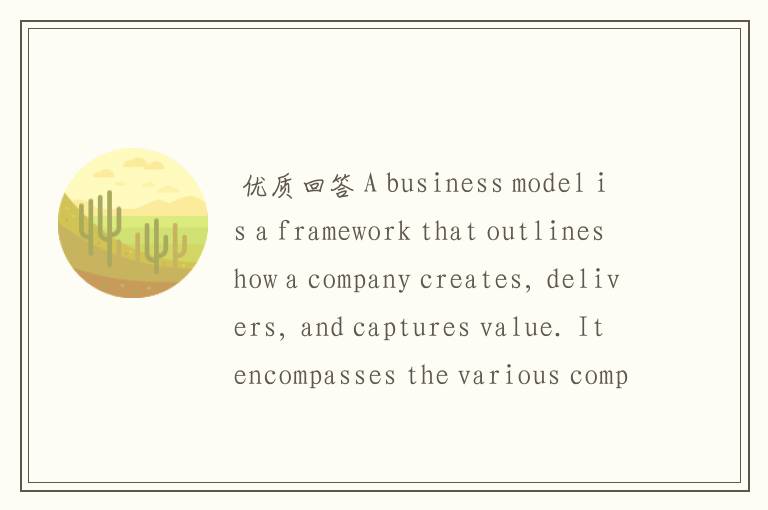- 1、
本文匹配到多条相关结果,欢迎阅读!
(一)

优质回答A business model is a framework that outlines how a company creates, delivers, and captures value. It encompasses the various components of a business, including its target market, value proposition, revenue streams, cost structure, and key activities.There are several types of business models, including:1. Product-based: This model focuses on creating and selling physical products. Companies using this model typically manufacture or source products and sell them to customers.2. Service-based: In this model, the company offers intangible services to customers. Examples include consulting firms, law firms, and healthcare providers.3. Subscription-based: Companies using this model offer a product or service on a recurring basis, usually with a monthly or annual subscription fee. This model is commonly used by software-as-a-service (SaaS) companies and media streaming services.4. Marketplace-based: This model connects buyers and sellers on a platform, facilitating transactions between them. Examples include e-commerce marketplaces like Amazon and ride-hailing platforms like Uber.5. Freemium: This model offers a basic product or service for free, while charging for additional features or premium versions. It is commonly used by software and app developers.6. Advertising-based: Companies using this model offer free products or services to users and generate revenue through advertising. Social media platforms like Facebook and search engines like Google use this model.7. Franchise: This model allows entrepreneurs to replicate a successful business by licensing its brand, systems, and processes. Franchisees pay an upfront fee and ongoing royalties to the franchisor.8. Direct sales: Companies using this model sell products or services directly to customers without intermediaries. This can be done through physical stores, e-commerce websites, or direct sales representatives.9. Asset-light: This model focuses on leveraging existing assets and resources rather than owning them. Companies using this model often outsource production, logistics, or other functions to third-party providers.10. Platform-based: This model involves building a platform that enables third-party developers or businesses to create and sell their products or services. Examples include app stores and developer platforms.These are just a few examples of business models, and many companies may use a combination of different models or create their own unique model. The choice of business model depends on factors such as the industry, target market, competitive landscape, and company's capabilities and resources.
阅读完本文《茶的故事》,您是否对有了更深层次的认识呢?请继续关注www.entea.com.cn,获取更多的精彩内容。
转载请注明来自,本文标题:茶的故事
本文地址:https://www.entea.com.cn/cbk/2906.html
